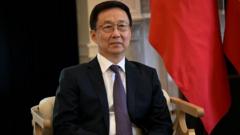As incoming President Donald Trump's inauguration looms, China prepares to make a noteworthy diplomatic gesture by sending Vice-President Han Zheng to the event, marking a significant moment in U.S.-China relations.
China's Vice-President Han Zheng to Attend Trump's Inauguration

China's Vice-President Han Zheng to Attend Trump's Inauguration
China signals willingness to engage with the U.S. as Trump's inauguration approaches.
China is set to make history by sending Vice-President Han Zheng to the inauguration of U.S. President-elect Donald Trump on January 20, 2025. This decision is particularly notable as it marks the first time a senior Chinese official has attended a U.S. presidential inauguration. Han's selection is seen as strategic; analysts view his ceremonial role as suitable for this occasion, allowing China to engage without sending President Xi Jinping directly.
Invitations to other foreign leaders, including Argentinian President Javier Milei and Italian Prime Minister Giorgia Meloni, have been extended, but Xi's choice to send Han speaks volumes about China's intentions. Recently, the U.S. administration has been vocal about its stance on China, highlighting potential tariffs on Chinese imports, and labeling China as America's most advanced adversary.
While traditionally, Xi has opted to send representatives rather than attending personally, Han's presence at the inauguration represents an unusual departure, indicative of Xi's desire to foster constructive dialogue with the Trump administration. Neil Thomas, an expert in Chinese politics, interprets this gesture as Xi wanting to set a collaborative tone, while maintaining a degree of distance from Trump.
Historically, foreign dignitaries of Han's rank have attended such ceremonies in other nations—Han himself was present at the inauguration of Indonesia's President Prabowo Subianto in October 2023. By sending Han, Beijing might be looking to display courtesy, while simultaneously shielding itself from potential fallout should U.S.-China relations sour under Trump's administration.
Han Zheng, who assumed the vice-presidency in March 2023 and is positioned just below the senior ranks of the Communist Party, has had a prominent role in driving key diplomatic initiatives, including the Belt and Road program. He previously worked closely with Xi in Shanghai, further cementing his status as a seasoned politician.
Despite his seniority, Han is not part of Xi's inner circle, allowing Beijing the flexibility to distance itself from him should relations deteriorate. This tactical choice underscores the delicate balancing act China is performing as it navigates the unpredictable political landscape in the U.S.
As the date draws near, observers are keenly analyzing how this diplomatic maneuver will influence the trajectory of U.S.-China relations amidst shifting global dynamics.





















